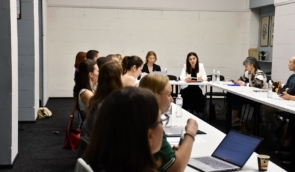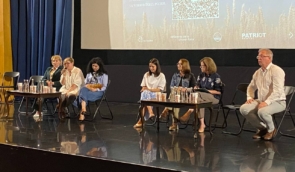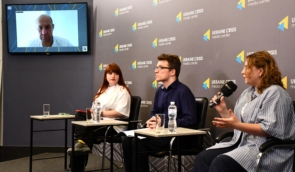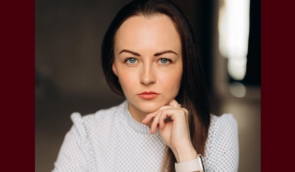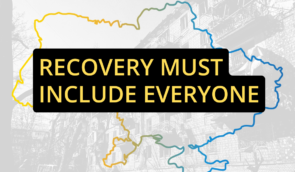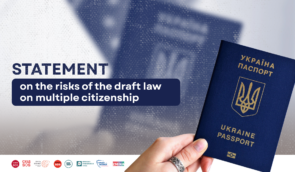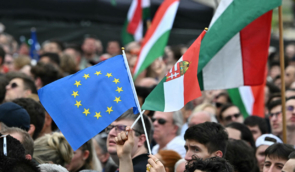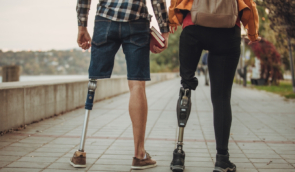Health of Kremlin’s political prisoners deteriorates as first deaths occur. Can Ukrainians return home alive?
In February 2023, two Crimean political prisoners, Dzhemil Gafarov and Kostiantyn Shyrinh, died in custody. They were sentenced to 12 and 13 years in prison, despite their critical health condition and disabilities. The political prisoners were charged with falsified cases. Namely, Kostiantyn Shyrinh was accused of espionage, and Dzhemil Gafarov of terrorism. The prisoners were not provided with adequate medical care, which led to their deaths.
 hromadske
hromadskeUkrainians in Russian prisons are subjected to physical and psychological violence, and do not receive medicines or medical care. Those who have health problems most often complain of dental and digestive system diseases, hypertension, visual and hearing impairment, and joint pain. Due to poor nutrition, unbearable conditions of detention, and abuse, some prisoners risk not surviving until their release.
Civil society activists are trying to draw attention to the situation. In particular, the Human Rights Center ZMINA has published the Gafarov-Schyrinh list, which includes the names of 21 political prisoners who need urgent medical care. All of these people have been persecuted for political reasons.
We look into what crimes Russia is committing against Ukrainian political prisoners and how Ukraine is helping to facilitate their detention.
“They do not allow prisoners to lie down or sit on the bed for 16 hours”
Deputy Chairman of the Mejlis of the Crimean Tatar people Nariman Dzhelyal was sentenced to 17 years in prison. He is being held in Simferopol remand prison SIZO-2, which, according to human rights activists, was created for detainees of the Russian FSB and abducted civilians from the newly occupied territories of Ukraine.
Nariman Dzhelyal is accused of blowing up a section of the gas pipeline that occurred on August 23, 2021, near the village of Perevalne in the vicinity of Simferopol. He and his brothers Aziz and Asan Akhtemov were detained in September 2021.
“The case is completely falsified,” says Nariman’s wife Leviza Dzhelyal. “All the suspects’ testimonies were obtained through violence and torture against the Akhtemov brothers. The case uses information from three classified witnesses whose faces are not shown and whose voices have been changed. That is, in fact, any person can sit there and read the words from a piece of paper. This is a well-established FSB scheme: without real witnesses, they use classified witnesses.”
According to the political prisoner’s wife, these witnesses claimed to be in Nariman’s close circle of friends, but did not know basic information about him. In addition, one of the witnesses had two different signatures on the documents. The prosecution did not present any other evidence: neither CCTV footage, nor wiretaps of cell phones.
For one year and seven months, Nariman Dzhelyal was held in remand prison SIZO-1 in Simferopol. In May 2023, he was transferred to SIZO-2. There, the conditions of detention became harsher.
“My husband was in a quarantine cell for a week. It is on the ground floor and has no windows,” says Leviza Dzhelyal. “They immediately shaved his head and beard, took away all his personal belongings, medicines, and food.”
Then he was transferred to a permanent detention cell. There, the political prisoner was not allowed to lie down or sit on the bed for 16 hours. From 6 a.m. to 10 p.m. he had to be on his feet. This led to swelling and varicose veins in both legs.
“There is a bench in the cells, but it is very narrow (about 10-15 centimeters). It has metal protrusions along the edges that dig into the skin if you sit on it,” says the political prisoner’s wife. “You can sit for about 15-20 minutes, and then you have to stand or walk around the cell.”
Leviza Dzhelyal started writing complaints against SIZO-2. She says that thanks to this, the prisoners’ conditions were made a little better and they were allowed to sit on their beds, albeit for a limited amount of time.
 Nariman Dzhelyal was sentenced to 17 years in prison. hromadske
Nariman Dzhelyal was sentenced to 17 years in prison. hromadskeBefore his imprisonment, Nariman Dzhelyal had problems with intervertebral hernias. Once a year, they made themselves felt, but he was treated at home. During his imprisonment, he had back pain three or four times, but he is not allowed to transfer any medicines that would relieve the pain.
“He copes with it somehow on his own. He doesn’t move, takes care of himself, so as not to provoke further pain,” says his wife. “At home, he could correct all this with medication, but in the detention center he does not have this opportunity.”
The wife of the political prisoner says that SIZO-2 does not accept parcels with any medicines. They say that they need a doctor’s prescription for specific medicines. Although in SIZO-1 they accepted vitamins, painkillers, and anti-inflammatory drugs.
“But they (SIZO staff – ed.) must be living in a different reality,” Leviza Dzhelyal says indignantly. “The SIZO says that Nariman does not complain about his health, and his outpatient card is clean, and he is absolutely healthy. But, according to my husband and other detainees, it is almost impossible to reach the medical staff in prison. For example, recently, Asan Akhtemov was lying with a temperature of 39 degrees [Celsius] for three days and no one came to him, we could not get through to the medical staff.”
After the appeal in Nariman’s case, on July 28, the detention center restricted the transfer of food for the political prisoner. Previously, the prisoner’s relatives could send 30 kilograms of food per month, now – only 20 kilograms for three months.
“We used to send weekly parcels with fresh vegetables, fruits, sausage, and cheese. Now we send parcels in limited quantities, and my husband eats the food they give him in the detention center,” says the political prisoner’s wife.
Leviza Dzhelyal is certain that the case against her husband is a criminal prosecution. Therefore, the only thing she hopes for is publicity about her husband and improvement of his conditions of detention.
“There is already a decision of the appellate court. They did not take into account Nariman’s critical health condition, the presence of four young children, an elderly mother who needs constant care, and the status of the official guardian of his, unfortunately, deceased father,” she notes.
“His hands are shaking, and his feet and toes are purple”
Another political prisoner, Ivan Yatskin, was illegally arrested on October 16, 2019. He was accused of “spying” for the Security Service of Ukraine (SBU). Immediately after his arrest, he was held in Moscow’s Lefortovo detention center.
In April 2021, he was transferred to Crimea, to SIZO-1. After being sentenced to 11 years in a strict regime colony, he was transferred to the place of serving his sentence – the strict regime penal colony No. 44 in the city of Belovo, Kemerovo Oblast.
“Before his arrest, Ivan suffered from thrombophlebitis (a disease of the human venous system that is accompanied by the formation of blood clots – ed.), which caused trophic ulcers on his legs,” says the political prisoner’s wife, Gulnara Kadyrova. “In addition, severe headaches and chest pains have been added, his eyesight has worsened, and his teeth are hurting and deteriorating.”
The political prisoner’s wife says that in prison, Ivan was forced to go outside to exercise in the cold in rubber slippers. If he resisted, he would be put in an isolation ward. In Ivan’s cell, the window was specially opened wide and they made sure that he could not close it. He was kept without shoes all this time.
“As a result, Ivan has frostbite on his feet,” says his wife. “He is not given any medicines or medicines. At first, some of the prisoners helped him, giving him their medicines. That’s how my husband pulled through.”
Gulnara says that she has three long dates with her husband a year. They last three days. However, due to the long distance to the place of detention, her work, and caring for three small children, Gulnara saw Ivan for the first time during his imprisonment in Belovo only this spring.
“Ivan was very happy to see us. He didn’t complain about his health: he has the kind of character that keeps silent to the last. But I noticed that his hands were shaking, and his feet and toes were purple in color,” recalls Gulnara.
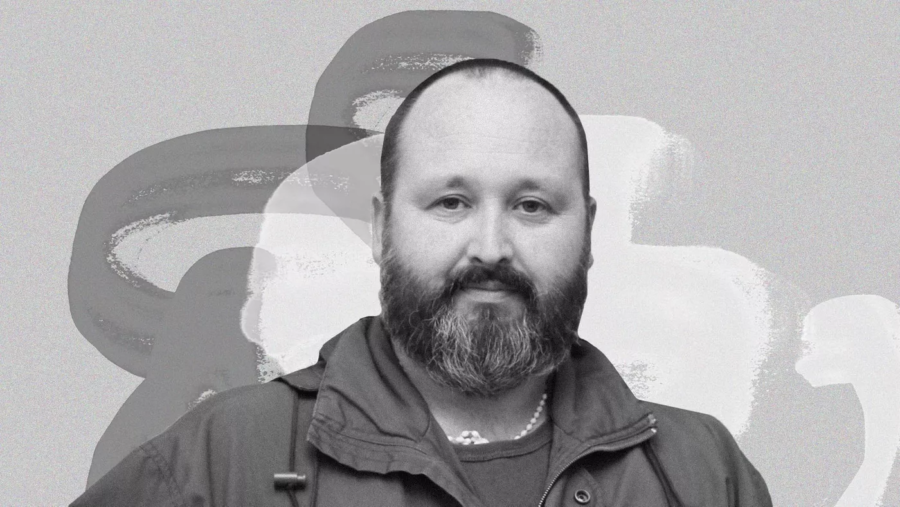 Ukrainian political prisoner Ivan Yatskin. hromadske
Ukrainian political prisoner Ivan Yatskin. hromadskeBefore Russia’s full-scale invasion of Ukraine, Ivan Yatskin’s lawyer was Nikolai Polozov. However, at the beginning of the full-scale invasion, he left Russia, and the prisoner was left without a defense lawyer. His wife began to look for a new lawyer and eventually used the services of a lawyer from the city of Kemerovo, who represents Ivan’s rights regarding the conditions of detention.
“Recently, the lawyer visited my husband and he said that thanks to our numerous complaints about the conditions of detention, Ivan managed to establish contact with the medical unit and began to receive medical care and he can even call home,” says his wife.
Gulnara is convinced that her husband is being abused in prison because of his pro-Ukrainian stance and unwillingness to obey the “local” rules.
“The only help that is possible for Ivan today is proper treatment in the colony and no abuse,” says his wife. “We also want Ivan to be transferred closer to home, to Crimea. There are many colonies all over Russia, but for some reason they decided to send him almost 5,000 kilometers away from home.”
Denial of medical care is the policy of the Russian torture machine
Human rights activists are aware of at least 180 political prisoners held in Russia and occupied Crimea. Most of them are Crimean Tatars. About 40 people have chronic illnesses, disabilities or are elderly.
“Most often, prisoners have dental problems, heart disease, liver problems, chronic diseases are exacerbated by terrible food and poor conditions of detention,” says Iryna Sedova, researcher and analyst at the Crimean Human Rights Group. “If a person is suspected of having any of the diseases, they are not examined, and relatives are not allowed to hand over medicines. This is an element of torture and abuse.”
Iryna Sedova recalls Ukrainian human rights activist and citizen journalist Iryna Danylovych, who was abducted in Crimea on April 29, 2022. She was sentenced to 6 years and 11 months in prison for allegedly possessing an explosive device. During her time in detention, she lost hearing in her left ear, has constant headaches, problems with coordination, and suspects that she suffered at least one microstroke in detention.
“Iryna approached the colony’s nurse and asked for help. She said she could not hear anything except for tinnitus. The doctor replied that she would not treat her: she would completely lose her hearing, and then noises would definitely not bother her,” says Iryna Sedova. “This is the policy of the Russian torture machine called the Federal Penitentiary Service. Doctors deliberately do not provide political prisoners or victims of religious persecution with medical care so that the person simply dies and stops bothering them.”
The issue of releasing civilians is very difficult
Iryna Sedova explains that the situation with the detention of political prisoners in the occupied Crimea and on the territory of Russia has changed significantly since the beginning of the full-scale invasion. First, before the complete cessation of diplomatic relations, representatives of the Ukrainian consulate in Russia were able to visit Ukrainian prisoners in pre-trial detention centers and monitor the attitude of the institution’s staff towards them. And secondly, Ukrainian and international law does not allow for the exchange of civilians – only prisoners of war for prisoners of war.
“But in practice, we see that sometimes some civilians are released as part of the exchange of military personnel,” notes Iryna Sedova. “Therefore, a mechanism for releasing hostages should be developed and promoted by the authorities.”
The Secretariat of the Ukrainian Parliament Commissioner for Human Rights reported that despite the absence of Ukrainian consuls in Russia, they are monitoring the situation with political prisoners, looking for ways to improve their conditions of detention and release. They also add that despite numerous appeals to international institutions that are supposed to protect human rights, they hear that more time is needed to resolve the situation.
“The main problem is that international partners are ready to get involved in solving problems where there can be results. For example, the issue of children. There is a result of the work of the state authorities on the return of deported children, so international partners want to get involved and facilitate their return. They understand that sooner or later the Russian side will release a small or large number of these children,” the Commissioner said. “As for civilian hostages, the issue is very difficult. The Russians always say that ‘civilian hostages are Ukrainian spies, we have convicted them, we did not violate international humanitarian law’. However, they have been held in prisons for years without sentences, the Red Cross is not allowed to visit them, and their families and friends are not informed of their whereabouts.”
One of the ways to release political prisoners was presented by President Volodymyr Zelenskyy in November 2022 at the G20 summit. There, he outlined the conditions for peace with Russia, where the fourth point is the release of all captured and deported Ukrainian citizens, including Crimeans who were illegally detained in Crimea.
To this end, the ombudsman called on representatives of foreign states and international organizations to join the development of mechanisms for returning Ukrainians home through a third country, international organizations or in other ways. There was also a proposal to create an international working group that could access places of detention of detained Ukrainian citizens. However, this has not yet been implemented.
Released from captivity, but did not receive proper assistance
On January 26, 2022, Ukraine adopted a new law on the social and legal protection of civilian prisoners. However, Iryna Sedova says that no regulations have been developed to allow this law to work. This means that now people released from captivity cannot receive free treatment and rehabilitation when they return home, as required by law.
“In addition, we (human rights organizations – ed.) constantly give recommendations in which we emphasize that, in addition to the physical rehabilitation of prisoners who have been released, it is very important to develop a state program for the social and psychological rehabilitation of such people,” the human rights activist adds.
What about the torturers?
Currently, a number of Ukrainian human rights activists are compiling lists of those involved in torture and failure to provide medical care to Ukrainian political prisoners. They include heads of penitentiary institutions, heads of medical units, judges, and prosecutors. There are about 30 people involved per persecuted person.
“One of the heads of a medical institution under the Federal Penitentiary Service left to work in Moscow. The information that she used to run a medical institution in one of the pre-trial detention centers in Crimea is gradually disappearing from the public space. The same applies to judges who sentenced Ukrainian political prisoners. That is why it is important to collect all the data and record it,” says Iryna Sedova.
The human rights activists plan to submit the lists to international institutions and Ukrainian law enforcement agencies in order to bring the perpetrators to justice or impose sanctions on them.
“Our primary task is to stop the system of politically motivated persecution and failure to provide assistance to Ukrainian political prisoners,” says Borys Petruniok, research analyst at the Human Rights Center ZMINA’s Torture Documentation Project.
Author: Anastasia Koval
Source: Hromadske
If you have found a spelling error, please, notify us by selecting that text and pressing Ctrl+Enter.


